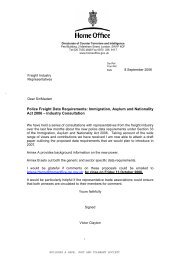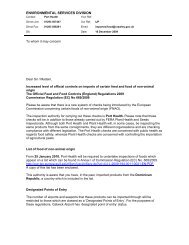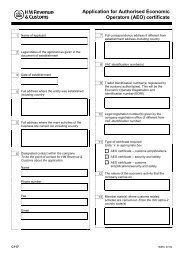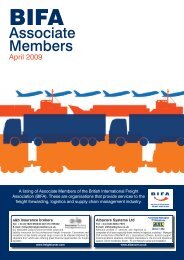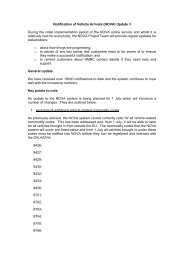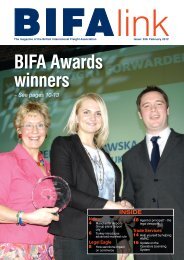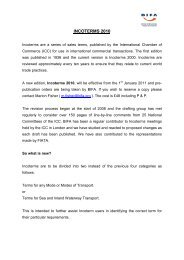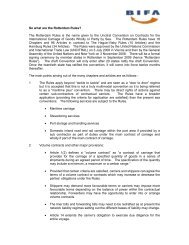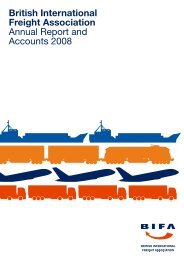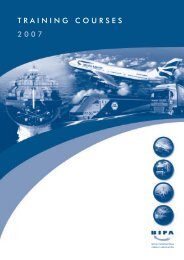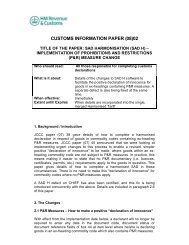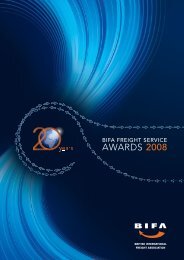BIFAlink cover - British International Freight Association
BIFAlink cover - British International Freight Association
BIFAlink cover - British International Freight Association
- No tags were found...
Create successful ePaper yourself
Turn your PDF publications into a flip-book with our unique Google optimized e-Paper software.
tradeservices<br />
www.bifa.org<br />
IATA–Isawindof<br />
change in the air<br />
BIFA has consistently argued that some of IATA’s behaviour towards<br />
solvent and profitable freight forwarders is unfair. This has been<br />
highlighted again by some recent incidents. However, there are now<br />
reasons to hope for an eventual improvement in IATA’s approach.<br />
The UK forwarding community’s<br />
overall settlement conformity to<br />
the terms and conditions applying<br />
to the settlement of airline<br />
revenues, under <strong>International</strong> Air<br />
Transport <strong>Association</strong> (IATA’s) Cargo<br />
Agents Settlement System (CASS),<br />
remains at or around 98%.<br />
Remarkably, as has been<br />
reported before in <strong>BIFAlink</strong>, this<br />
impressive statistic has been maintained<br />
despite the global financial<br />
crisis that forwarders and their<br />
customers have had to endure over<br />
the past year or two.<br />
Forwarders have compliantly<br />
supported their airline membership<br />
during this unprecedented period of<br />
financial uncertainty. So readers<br />
could be forgiven, therefore, for failing<br />
to understand the reasoning<br />
behind IATA’s remorseless crusade<br />
against forwarders who it deems to<br />
have had the temerity to exceed<br />
their credit limit under the CASS<br />
conditions.<br />
By way of example and to set the<br />
scene, the Secretariat was alerted<br />
recently, by three members because<br />
their hitherto monthly airline freight<br />
revenue payments, settled through<br />
CASS in full and without delay, had<br />
exceeded their average in a given<br />
month.<br />
As a consequence CASS formally<br />
requested that these members<br />
subject their company financial<br />
figures for audit by<br />
CASS in order to establish<br />
their solvency. As a<br />
result of the reviews, each<br />
received a subsequent<br />
demand to provide substantial<br />
bank guarantees. Failure to<br />
provide these warranties could,<br />
according to the CASS rules,<br />
result in a withdrawal of airline<br />
credit facilities.<br />
It has beeen established that in<br />
all three cases the members in question<br />
had actually had the good<br />
fortune (so you would have thought)<br />
to have experienced a short-term<br />
unexpected increase in business.<br />
This in turn was reflected, we must<br />
assume, in an equally welcome boost<br />
to the bottom line revenues of the<br />
carrier(s) who doubtless accepted<br />
the bookings in the first place with<br />
outstretched arms. All sums due, for<br />
the months in question, were subsequently<br />
settled in full and on time.<br />
None of the members had any previous<br />
record of default or late<br />
payment.<br />
Disconnect<br />
In these cases, we would argue that<br />
IATA’s rigid interprepation is symptomatic<br />
of its inability to represent<br />
the best interests of its membership,<br />
the airlines and their customers, the<br />
forwarders. Indeed, it would be<br />
difficult to provide a better illustration<br />
of the apparant disconnect that<br />
exists between this prominent body<br />
and the carriers whose interests it<br />
purports to uphold.<br />
The reality is that airlines and<br />
freight forwarders contract daily on a<br />
bilateral basis – being transportation<br />
provider and customer respectively.<br />
At no stage during this process,<br />
which involves both parties reaching<br />
commercial agreement on the like of<br />
service levels and freight charges,<br />
does IATA enter into the equation.<br />
Not until, that is, it comes to the<br />
settlement procedures for the freight<br />
charges in question.<br />
Here the airlines and forwarders<br />
set aside any bilateral mechanism in<br />
favour of using the centralised CASS<br />
portal to process their revenues and<br />
payments respectively. This affords<br />
airlines and forwarders alike with a<br />
single billing and payment facility,<br />
and the attendant economies of cost<br />
and efficiency.<br />
What is not so equitable is that<br />
the airlines have effectively vested<br />
their authority in IATA, without<br />
recourse to an airline or airlines, to<br />
determine a forwarder’s suitability to<br />
remain in the programme. This is as<br />
unacceptable just as it is, ultimately,<br />
we believe, going to prove unsustainable.<br />
Using its own measurement criteria,<br />
the financial credibility, or otherwise,<br />
of a given forwarder can be<br />
assessed by IATA.<br />
In other words, a body that is not<br />
party to the original contract<br />
between airline and forwarder can<br />
demand that the latter provide it<br />
with financial returns. Not to accede<br />
to its bidding, or the failure of the<br />
figures provided to meet with<br />
IATA’s own solvency criteria, can<br />
result in IATA withdrawing credit<br />
facilities for all airlines from the<br />
forwarder in question.<br />
The airlines choose to take no<br />
part in such decisions, even though<br />
it is their customers and their<br />
revenues that are at the heart of the<br />
issue. We could not imagine that, in<br />
a similar scenario, members would<br />
allow the BIFA Secretariat to exercise<br />
similar authority over their business<br />
activities.<br />
One criteria relates to sales<br />
growth. Turnover in the<br />
current year is compared<br />
with that in the previous<br />
year. If the growth falls<br />
below IATA’s own measurement<br />
a ‘failure’ is recorded. So,<br />
somehow sales growth equates to<br />
financial solvency. Not, we would<br />
submit, even in the eyes of an<br />
informed accountant would that be<br />
the case.<br />
10 November 2010



